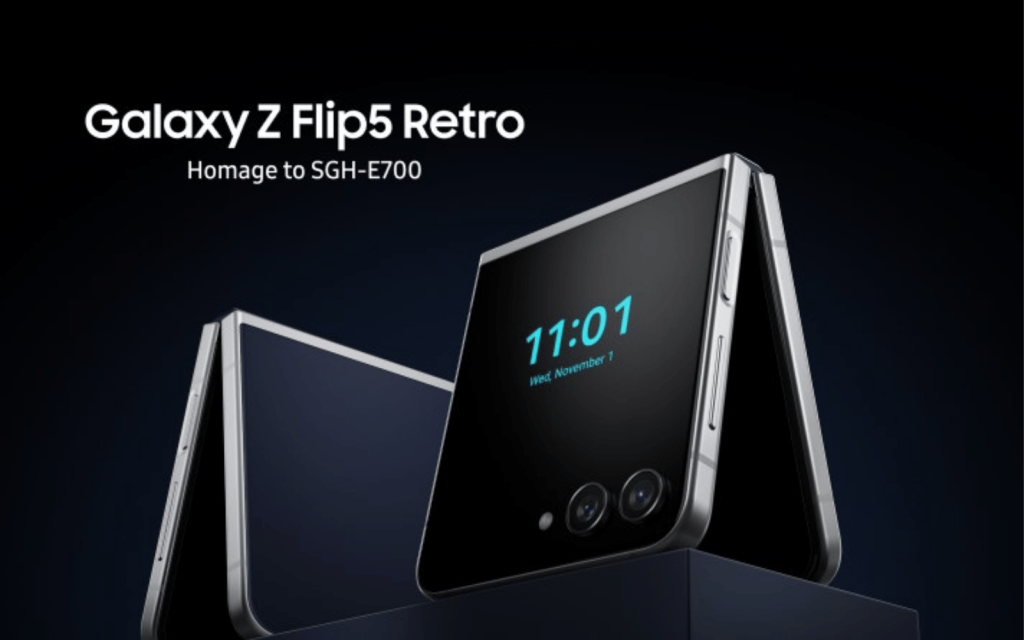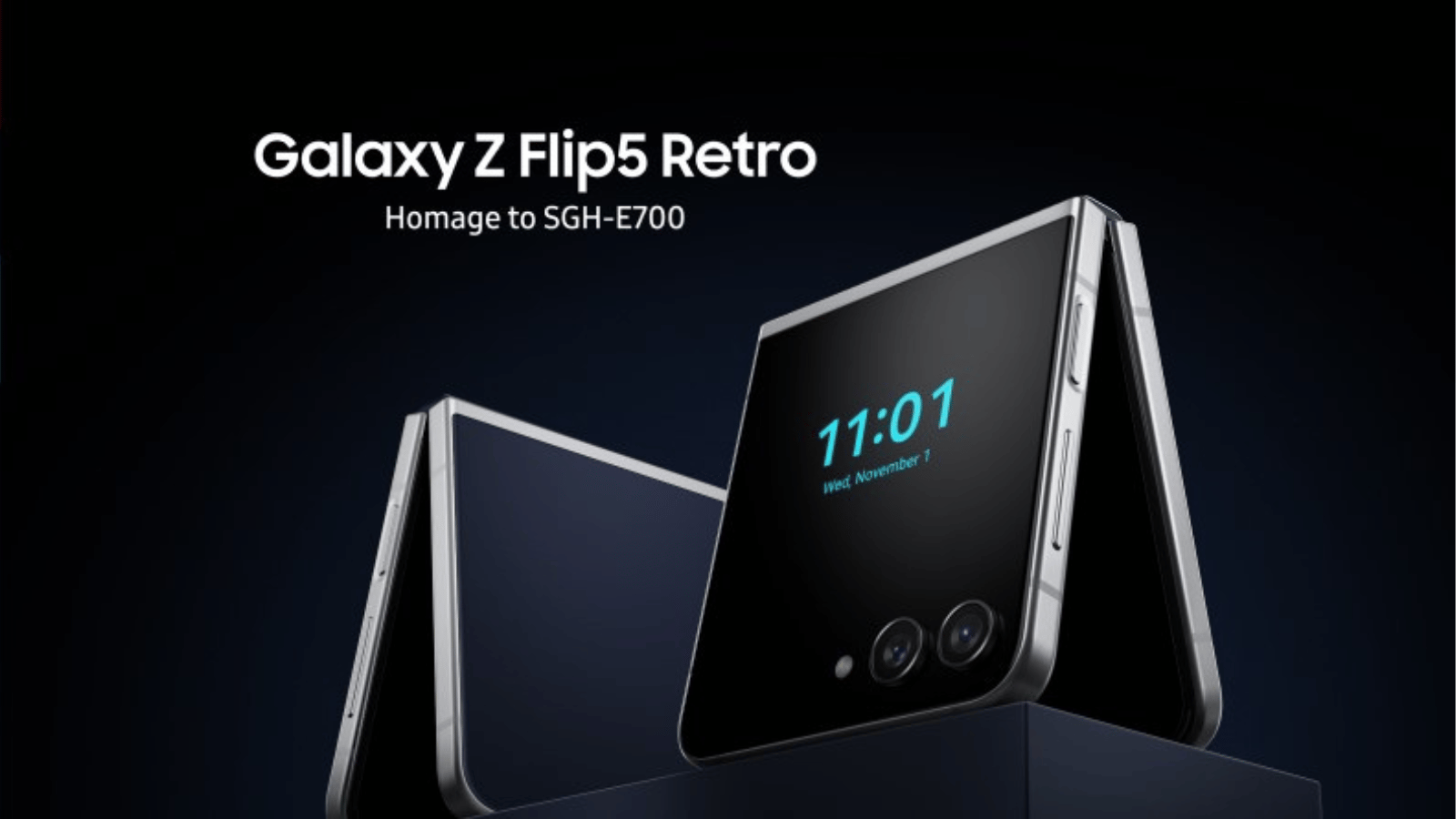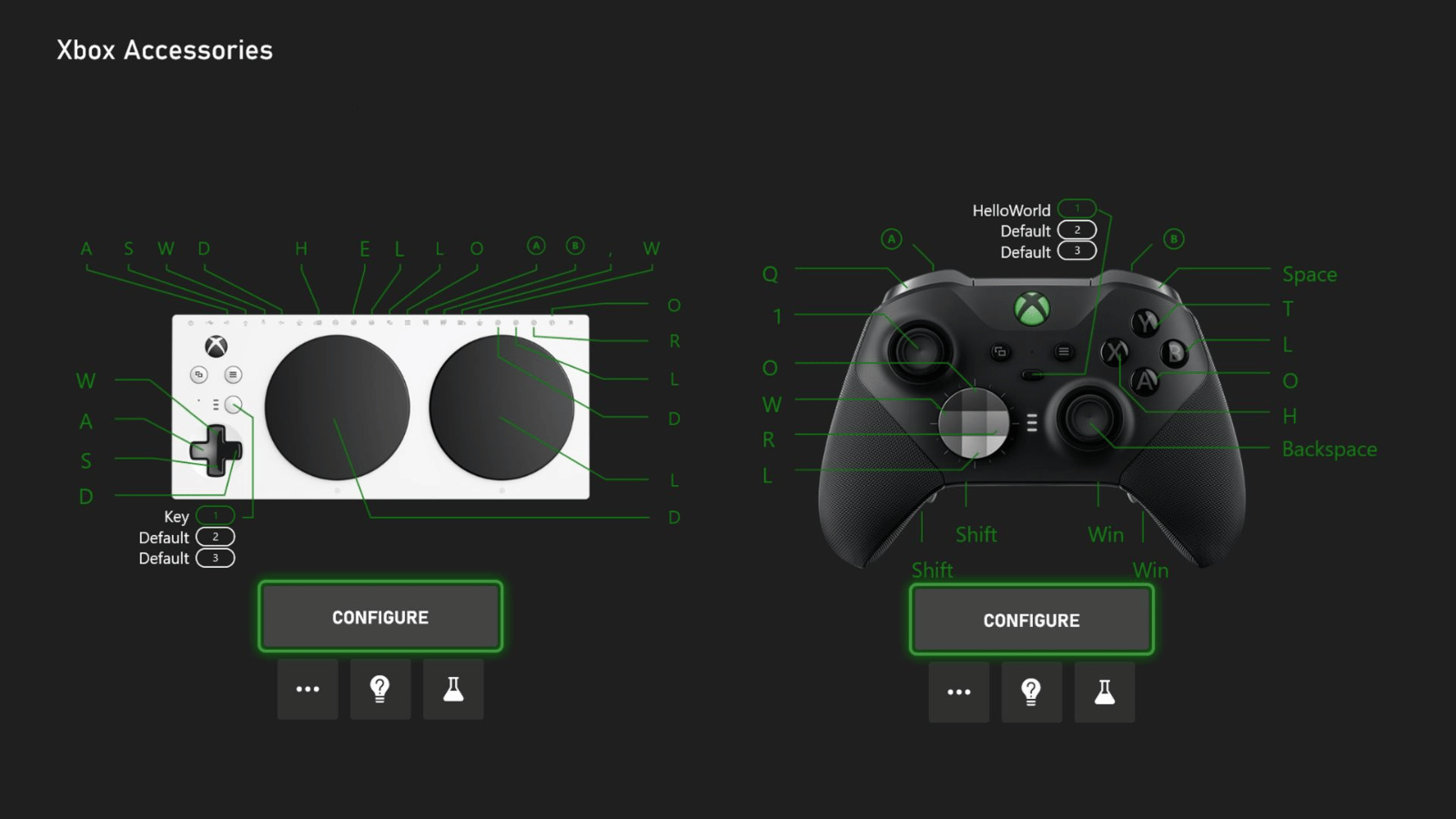Enter the Galaxy Z Flip5 Retro
People love to believe their lives were better way back when. It’s a phenomenon that Big Tech has preyed on for the better part of twenty years. Hell, Samsung’s whole side-schtick for the time being is to sell off those phones that flip and fold like phones from the 90s. Apparently, that’s not enough. Samsung is dipping its toes even further into the nostalgia pool with the Galaxy Z Flip 5 Retro.
It’s a limited-edition version of the current Flip 5, toting a rather endearing shell that’s paying homage to the iconic Samsung SGH-E700 that first hit the shelves in 2003. Expect to see the same mix of indigo blue and silver on the body and some regressive pixel graphics on the phone’s clock widget on its face. All in the name of sentimentality.
Just don’t get too attached to the idea of sticking this one in your back pocket if you’re a South African. Samsung’s unfortunately refining the Retro’s launch to a few countries; Korea, France, Germany, Spain, Australia and the UK. It’s even skipping a US release, which means getting it across the sea might be an issue.
It’ll be available on 1 November 2023 through Samsung’s official site if you’re willing to try your hand at getting hold of a piece of Samsung’s history. No price was mentioned, though don’t expect it to stray far from the original Flip 5’s near R30,000 price tag.
ChatGPT Plus gets new powers
Everyone’s favourite large language model-based artificially intelligent chatbot ChatGPT is getting some new powers. Well, it is if you’re one of the few paying the $20/m subscription fee (R380/m) for access to ChatGPT Plus.
OpenAI began rolling out new beta features, according to The Verge, that introduce the ability to upload files and work with them in the model, alongside multimodal support. Essentially, it’s saving users from having to select a model, with GPT doing it for you based on context.
These changes are gradually rolling out to Plus users, so it might take a minute for either update to hit your device. When the former arrives, you’ll be able to chat with GPT directly about files. And according to @luokai on Threads, “You can also chat with data files and other document types.”
Once a file has been uploaded, it’ll reportedly take a moment to digest before it’ll engage in any conversations around it. When it’s ready to work, GPT can do things like summarize the file’s content, answer questions about it or concoct up some general data visualisations about what it saw.
It even works with and understands image files. Ask it to turn an image of a capybara into something out of Pixar’s studios, and it’ll do it. Send another image – this time of a skateboard – and it’ll combine the two. Hey, it’ll even throw in a free hat.
Poisoning generative AI
Unfortunately, that’s exactly what’s upsetting artists around the world. Many, like those that work for Pixar, are being outmanoeuvred by generative AI models that can cook up a cutesy, hat-wearing capybara in just a few minutes. That looks mightily attractive for the higher-ups looking to save a buck. It’s not just an issue for art, though. AI is alarming every industry it steps foot in, and it’s not going away. But there might be a way for artists to fight back.
It’s called Nightshade, and it’s a tool developed by a team of researchers that’s designed to confuse generative AI and forcing it to spit out entirely wrong images. Nightshade “poisons” images that models might use to train themselves by adding secret (and invisible) pixels to art before it’s uploaded to the web.
MIT Technology Review, which first reported on Nightshade, reckons “using it to ‘poison’ this training data could damage future iterations of image-generating AI models, such as DALL-E, Midjourney, and Stable Diffusion, by rendering some of their outputs useless — dogs become cats, cars become cows, and so forth.”
It could disrupt the entirety of the generative AI industry. It might encourage companies such as OpenAI to simplify the removal of personal art from DALL-E 2’s crop of training data which has so far been described as ‘enraging’.
Microsoft’s remapping accessibility in the gaming industry
Gaming is becoming more accessible. Whether it’s through Sony’s Project Leonardo controller, or one of Microsoft’s dozen or so accessibility features, the industry is growing to accommodate more people. The OS giant is expanding upon that today with the release of a new keyboard mapping feature that’ll let players rebind buttons on their Xbox controllers as they see fit.
The feature was first announced a few weeks back (alongside a bunch of other stuff) and is finally ready to go. Players rocking an Xbox Elite Series 2 controller or Xbox Adaptive Controller can now configure them to match specific keys on their keyboards. The whole idea is to “help expand controller input capabilities in games that have many commands, have limited remapping capabilities, or do not support controllers.”
You’ll need the Xbox Accessories app downloaded on your PC and one of the controllers we mentioned to get anything done. Hook them up to the PC and start remapping. Xbox uses Sea as Thieves as an example, noting that the game could “take keyboard input for something like quick select of a tool or weapon, while using controller for most other actions.”








